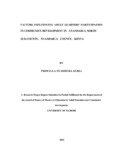| dc.description.abstract | The main purpose of the study was to examine the factors that influence participation of
adult learners in community development. The objectives sought to establish how basic
literacy education of adult learners, social background, religion, cultural and economic
endowment influence adult learners’ participation in community development. Using ex-
post facto research design, data was collected through a questionnaire which was
administered to a sample of ninety nine adult learners and nineteen adult education
teachers who were selected through stratified and simple random sampling techniques in
Nyandarua North Sub-County. Data were analyzed through descriptive statistics
specifically frequency and percentage. The study offers useful insights to the Ministry of
Education, adult learning programme as well as the Ministry of Devolution, community
development organizations/projects on intervention strategies to be initiated with a view
to improving adult learning and enhancing participation in community development
organization activities respectively. Lack of adequate education towards what entails
community based organizations/projects (CBOs) and inadequate knowledge in
community matters were the major social hindrances to learner’s participation in CBOs.
Academic qualification did not hinder one from participating in CBOs activities as a
member but a factor when it came to assuming managerial positions. Most adult learners
(75.0%) were affiliated to religious organization and had community based activities that
were beneficial both to the church as well as the individual members. The adult learners
(82.6%) felt that religion affiliation create a platform for achieving what an individual
had a challenge in realizing. The main cultural factors were the nature of work and the
need to educate the young influenced adults participation in CBOs. Women were
involved more with work at home (58.7%) as well in community development activities
(46.2%) than men with 32.5% and 23.8% respectively. Lack of adequate resources
including lack of finances as well as lack of immediate financial benefits was the main
economic factors that hindered full participation in community development projects.
When no financial benefits were forthcoming, adult learners withdrew from the projects
to create time for activities that they could earn from.
The study recommends that other scholars to carry out a similar study through its
concerned institutions/ stake holders in adult learners institutions and other private sector
in other Nyandarua Sub-Counties and also in various parts of other Kenyan Counties. | en_US |

